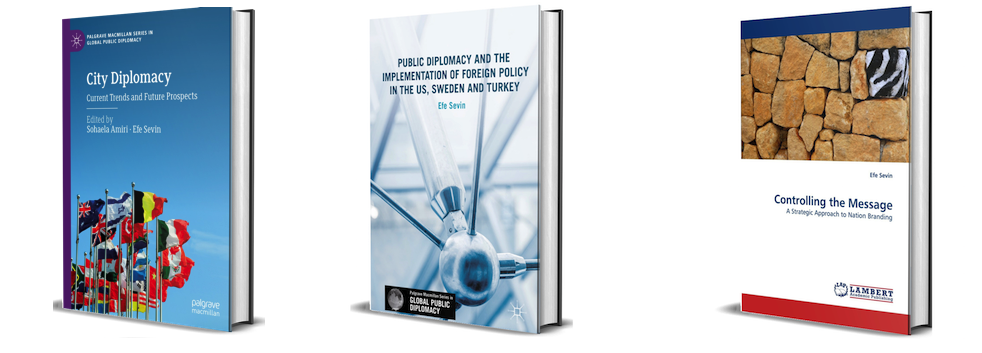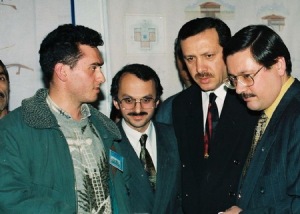I am well aware of the fact that my ‘career’ as a scholar is too short to start re-visiting some of my earlier works. Yet, Erdogan’s speech – which marked the 10th anniversary of AKP (Justice and Development Party) – made me go back to a short rhetorical analysis I carried out three years ago about Erdogan. A blog post is definitely not the place to visit this research. Here, I simply want to discuss my conclusions, state the fundamental rhetorical threats coming from AKP to Turkish identity directly and Turkish soft power indirectly, and take a closer look at Erdogan’s celebratory speech.
My conclusions in 2008, I argue, still reflect the reality. Erdogan symbolizes AKP in person – Erdogan is the party. He uses his personal identity to (i) reflect social values on politics, (ii) create a family analogy within the Turkish society (which is not new in Turkish politics), and (iii) play the ‘victim’ card. His rhetoric is built on conservatism, victimization, and populism. He uses conservative elements, nation vs. state comparison, and victimization stories. When talking about an ‘other’, he uses pressure in forms of majority (i.e. we got 50% of the votes), stability (i.e. remember the economy before 2002), and international consensus (i.e. headscarf is not banned in European countries).
Again, as a student of politics and international relations, I try to stay open-minded about different ideologies, strategies, parties, and people. My political opinion, stance, and beliefs (should) have nothing to do with my studies. However, there are two issues with AKP that I cannot accept, and therefore believe AKP and Erdogan are changing Turkish identity, and highly de-valuing ‘Turkish brand’.
Issue Number 1: Erdogan’s mustache: Apart from the fact that it looks ridiculous, Erdogan’s mustache clearly states his political, ideological, and religious stance. Mustache has been an important aspect of politics in Turkey for a long time. Turks have been able to identify political allies and opponents through their facial hair for a long time. Erdogan’s conservative democrat (also called moderate Islamic in politically incorrect communities) mustache brings religion into the equation, therefore symbolizes a more coherent community. If you do not accept one of his principles, let it be AKP’s unquestionable (!) record of success or Sunni Islam, you are an outsider. Headscarf is the equivalent of mustache for women. Different religious sects in Islam wears the headscarf in a different way. Therefore, all individuals are able to identify and label each other when they meet.
So, what is the problem with that? Well, AKP is surrounded by a community that is coherent in terms of religious beliefs and political ideology. They are clearly labelled by mustaches and headscarves. Outsiders can be identified instantly. (By the way, here is a great post by Ali Erol on how outsiders are defined by insiders – in Turkish).
Issue Number 2: Redefining the terms: Let’s face it, AKP never faced a ‘serious’ political opposition in Turkey (Also, one might argue that several court cases such as Ergenekon, and Balyoz, as well as numerous personal cases brought to court by Erdogan, and the fact that Turkey has the highest number of journalists in jail might have an impact on this lack of opposition). Within this framework, Erdogan and AKP have redefined several terms in Turkish political parlance. Let me highlight a couple of points from yesterday’s speech.
First of all, the 10th year celebration take place during an ‘Iftar’ dinner of twenty thousand people. Therefore, it is not surprising to find religious references in any given speech. However, following points should be noted:
Role of Turkey in bigger picture:
Her zaman zayıf olanın yanında olan milletimizin kalbi, Somali’deki kardeşlerinin yanındadır.
Our nation’s heart, that has always been with the weak, is with its brothers in Somalia.
Somalia is our newly found brother, and Turkey is expected to help developing countries. There is nothing wrong with being a contributor in development projects. On the contrary, it is a desirable position for Turkey within the international arena. Yet, given the facts that Turkey is sending ‘aid’ (prepacked food and other materials) to an Islamic country during Ramadan and that donations have been asked with Ramadan-themed commercials, Turkey seems to be aiming for a ‘protector of Islamic nations’ role.
Our ‘history’
Ama unutmayın o cehalet döneminde bile kimse kimseye kurşun sıkmazdı….Biz şuanda ramazan için sabrediyoruz ama ramazandan sonra bu barış işini tekrardan görüşürüz.
Don’t forget, even during the era of ignorance, nobody fired…We are not doing anything during Ramadan, but after Ramadan we will talk about this peace business again.
As the Turkish nation, we are expected to draw our ‘historical’ lessons from the history of Islam in the Arab peninsula. Ramadan seems to point to an important reference point even in military operations. Thus, if one claims that contemporary Turkey can be seen as the continuation of an Islamic-Arabic tradition, he or she won’t be absolutely wrong.
What makes us a nation?
Zaten İmralı’daki Kürtlerin dininin Zerdüştlük olduğunu ilan etmişti. Acaba Kürtlerin dininin Zerdüştlük olduğunu kabul eden kaç tane bana Kürt kardeşimi gösterebilirsiniz?…Ben inanıyorum ki benim Kürt kardeşlerimin tamamına yakını İslam diyecektir.
The one in Imrali (referring to captured head of PKK, Ocalan) have declared Zoroastrianism as the religion of the Kurds. I wonder how many Kurdish brothers of mine you can show me who will agree that the Zoroastrian religion of the Kurds?…I believe almost all of my Kurdish brothers will says Islam.
While talking about terrorist movement in Turkey and autonomy claims, Erdogan refers to religion once again. Kurds and Turks should live together, as both believe in Islam.
Us vs. Them, State vs. Nation
Milletvekili olabilme hakkım engellenirken, milletimiz bütün karanlıkları aydınlatmak üzere ışıkları yaktı.
When my right to become a deputy was blocked, our nation hit the lights to illuminate the darkness.
Even though nearly a decade passed since the Assembly solved his problem, Erdogan comes back to the fact that he was not allowed to be elected back in 2002. However, he continues to ignore a contemporary problem of similar nature – for instance, there are two deputy-elects from CHP, one from MHP who are still in jail without any indictment. There are five more independent Kurdish deputy-elects in jail from other legal cases. Hatip Dicle, another Kurdish independent deputy-elect was stripped of his rights, and his seat was given to AKP. Therefore, the contradiction is not necessarily between the will of the nation and the bureaucratic structures of the state. It is between us vs. them. Erdogan was one of ‘us’, therefore nation sided with him against state. But these nine deputy-elects are ‘them’, therefore regardless of their situation, nation should not side with them. Hatip Dicle and other deputies might be considered ‘other’ because of their religious views, and ethnic background. Haberal and Balbay of CHP, and Engin Alan of MHP are ‘them’ because they do not share the same political ideas. As I tried to argue, you need to have the same ideas, beliefs, and ideologies with Erdogan to be one of ‘us’.
And finally, I can come to public diplomacy, nation brand, and public diplomacy part. Turkey’s ‘selling point’, so far, has been the bridge between the East and the West. Turkey is versed in the East and in the West. Consequently, Turkey is able to understand both sides and transfer messages. The impacts of this brand has been observed in Turkish diplomatic affairs, foreign military deployments, and public diplomacy attempts. After this swift change of identity, Turkish brand right now is not credible, is not stable, and belongs predominantly to the East. Turkish public diplomacy attempts targeting Western audiences will suffer, as they face the threat of being seen as too ‘foreign’. Eastern audiences might ignore Turkish messages, given the lack of stability and credibility. Even though Erdogan wants to take the role of protector of Islamic nations, he failed to do so in Egypt, Libya, and largely in Syria.
Long story short, in 10 years, Turkish identity and the majority of political terms in Turkey have been re-defined. In 2002, Turkey was a country which stood equally close to the East and the West. Right now, we stand far away both from the East and West.




Hello brother i read your whole article your analysis is to be honestly pretty impressive and academically however why did you avoid to mention about Kurdish parliamenterians .As you know there are still six elected Kurdish parliamenterians who are still in jail Since you are a canditate of bright scholar I suggest you try to isolate yourself from nationalism as much as you can . do not take me wrong .I really liked your article .LOVE FROM TURKEY YOUR KURDISH BROTHER ……
Thanks for the comment. You are actually right. I focused on MPs from CHP firstly because they are linked with the Ergenekon case and secondly because Hatip Dicle’s situation is technically different from Erdogan, Haberal, and Balbay. As you know, Dicle is no longer an MP, while Haberal and Balbay are. But despite this technical difference, the situation is the same. Citizens voted for a candidate in a popular election, but the result of the election was ignored.
I updated the post to include six Kurdish MPs, as well as Engin Alan – an MP from MHP.
Thanks alot for your kind reply and quick update make sure that you made me so happy . I will continue to follow your articles .Does the blog belong to you ? how often do you write ? if you write somewhere else let me know to follow your articles i read your article a couple of times your style looks like Hasan Cemal who is my favourite columnist in terms deep analysis . Keep in touch love from your homeland Turkey ……
Thanks. Yes, this is my blog. I write only here about Turkish politics and foreign policy and try to blog once every couple of weeks – or when a new development takes place.